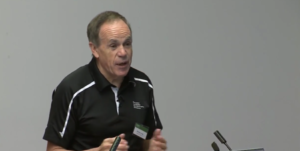Steve Long: Food, Feed and Fuel from Crops under Global Atmospheric Change. Could we have it all in 2030?
Filmed at the Gatsby Summer School, Leeds University, 2014
Abstract
Demand for our major crops is expected to rise 30% by 2030, while we look increasingly to croplands for energy as well as food and feed. This is at a time when the rate of increase in yield seen over the past 60 years is stagnating and when global change may be placing yield increase into reverse. New computationally guided biotechnological approaches are providing opportunities to overcome these limitations. Simultaneously emergent sustainable energy crops could be produced at scale using land unsuited to food crops. These opportunities to achieve 2030 goals, and their scientific base will be explained. Yet, societal and policy acceptance of these opportunities is likely our greatest barrier to having it all in 2030.
Speaker profile:
 Steve Long is Gutgesell Endowed University Professor of Plant Biology and Crop Sciences at the University of Illinois, and a Fellow of the Royal Society (London). He obtained his BS in Agricultural Botany at the University of Reading, UK and Ph.D. in Plant Sciences at Leeds University. His research has concerned maximizing crop photosynthetic productivity from the molecular to the field level, both via theoretical modeling and field scale experimental manipulations. His group has developed dynamic and steady-state models for analyzing and guiding improvement of crop photosynthetic efficiency. He has identified the most productive plants so far known from the wild and much of his work has focused on identifying the attributes that set these plants apart. He founded the SoyFACE facility, the largest of its type, providing open air analysis of how crops will respond to global atmospheric and climatic change. He was co-founder of 400 strong Berkeley-Illinois-BP Energy Biosciences Institute and today is Director of RIPE, a multi-national Gates Foundation supported project, that is increasing photosynthetic productivity of key food crops. He is Chief and Founding Editor of Global Change Biology and a Fellow of the Royal Society.
Steve Long is Gutgesell Endowed University Professor of Plant Biology and Crop Sciences at the University of Illinois, and a Fellow of the Royal Society (London). He obtained his BS in Agricultural Botany at the University of Reading, UK and Ph.D. in Plant Sciences at Leeds University. His research has concerned maximizing crop photosynthetic productivity from the molecular to the field level, both via theoretical modeling and field scale experimental manipulations. His group has developed dynamic and steady-state models for analyzing and guiding improvement of crop photosynthetic efficiency. He has identified the most productive plants so far known from the wild and much of his work has focused on identifying the attributes that set these plants apart. He founded the SoyFACE facility, the largest of its type, providing open air analysis of how crops will respond to global atmospheric and climatic change. He was co-founder of 400 strong Berkeley-Illinois-BP Energy Biosciences Institute and today is Director of RIPE, a multi-national Gates Foundation supported project, that is increasing photosynthetic productivity of key food crops. He is Chief and Founding Editor of Global Change Biology and a Fellow of the Royal Society.
http://www.tree.leeds.ac.uk/tree/uploads/Lectures/Long_S_SS14/video.html




Leave a Reply
Want to join the discussion?Feel free to contribute!